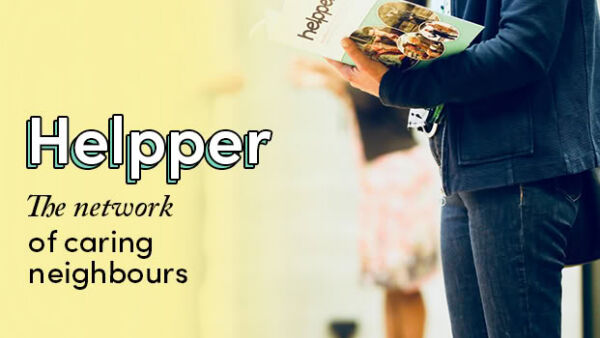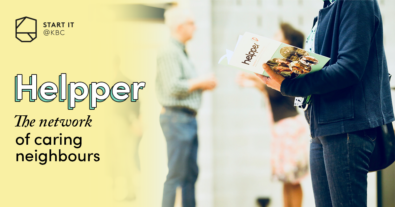Say hello to Helpper: helping good neighbours benefit from the sharing economy

Helpper connects people looking for help with day-to-day tasks with helpful locals who want to earn a little extra. In just over two years their growth has skyrocketed as they continue to expand across Belgium. In April they launched their mobile app, making it even easier for neighbors to find each other. Start it @KBC caught up with founder François Gerard.

Frustration as inspiration
Helpper started as a flash of inspiration born out of deep frustration. When founder François Gerard’s father became ill with amyotrophic lateral sclerosis (ALS), he slowly lost his mobility and needed a lot of help with daily tasks. François found that classic solutions in the care sector were lacking in availability and flexibility. “There are lots of people who make a difference and want to help, but are restricted by their organizations. For example, they say ‘we can come from 9 to 12’, while my dad sleeps until 11.” Helpers also faced transportation hurdles as not being available on weekends. “Finally we found someone in our neighbourhood who could help and was flexible. Then I thought: Actually, that’s the perfect solution – what if I could offer it to others? And that was the seed for Helpper.”
Helpper started up just as Belgian laws were signed supporting the sharing economy, allowing private citizens a certain amount of tax-free side income for providing certain types of social support. “Helppers” support the elderly, the disabled, the chronically ill and busy parents with everything from errands to mowing the lawn – or even just a little company. In exchange for a part of their hourly wage, Helpper takes care of all the insurance, payments and administration.
Quick iteration, quick growth
François called on his contacts in the consulting sector to raise his pre-seed capital on the basis of an idea. “They knew me personally, so we had a relationship of trust. That was my wild card.” Together with his first two colleagues, François put together an MVP in eight days in Antwerp to quickly test assumptions. His strategy: “Iterate very quickly, learn from the market (and see what it does) and then adapt quickly.”
In 2018 Helpper’s growth really kicked into high gear after raising €1 million during a seed round. A pivotal moment came when François and his team realized that they didn’t have to make the matches between supply and demand as part of their service, which had created an “operational hell” for both the team and the users. Once Helpper evolved to a closed marketplace where people are free to reach out to each other, everything fell into place. “After that we grew by 75% for ten months in a row, so it was the right choice,” says François. Helpper’s business model is based on a margin on each hour worked, so they have reach for volume, “but we get there” says François. “We’ve hit 16K hours a month, and we’re still growing fast.”
Marketing has posed a particular challenge for Helpper, as those offering help (“helppers”) and those who need it (“helppies”) require completely different strategies. Social media and PR were effective for reaching helppers, but similar approaches targeting helppies didn’t come up with good results. “We noticed that we had to reach that target group through trusted channels and really invest in cooperating with existing actors.” Not an altogether easy task, as care is a classic sector wary of new platforms (see Uber vs. taxis). Innovating the sector requires educating target groups about the role Helpper can play. “We aren’t against the sector, we’re building something together. We don’t want to replace anybody, we want to partner up with them.” Their efforts have paid off: Helpper now partners with the home care sector, physicians, and public welfare centers as well as major health insurance funds Partenamut, Partena and OZ.
The power of a network
At the Start it @KBC accelerator François has found new contacts, peer support and valuable mentors. “It started with free office space and a cool place to work. But you quickly realize that there’s a lot more added value than that, if you take advantage of it.” Another plus has been the “stamp of approval” effect: “You start out on your own, and then that logo from Start it @KBC gives you credibility.”
The most important lesson to pass on to other startups? “You’ve got to ask for advice. Dare to ask everyone, from the old hands to the entrepreneurs. Ask the coffee machine if you need to. It’s important to have a sounding board.”